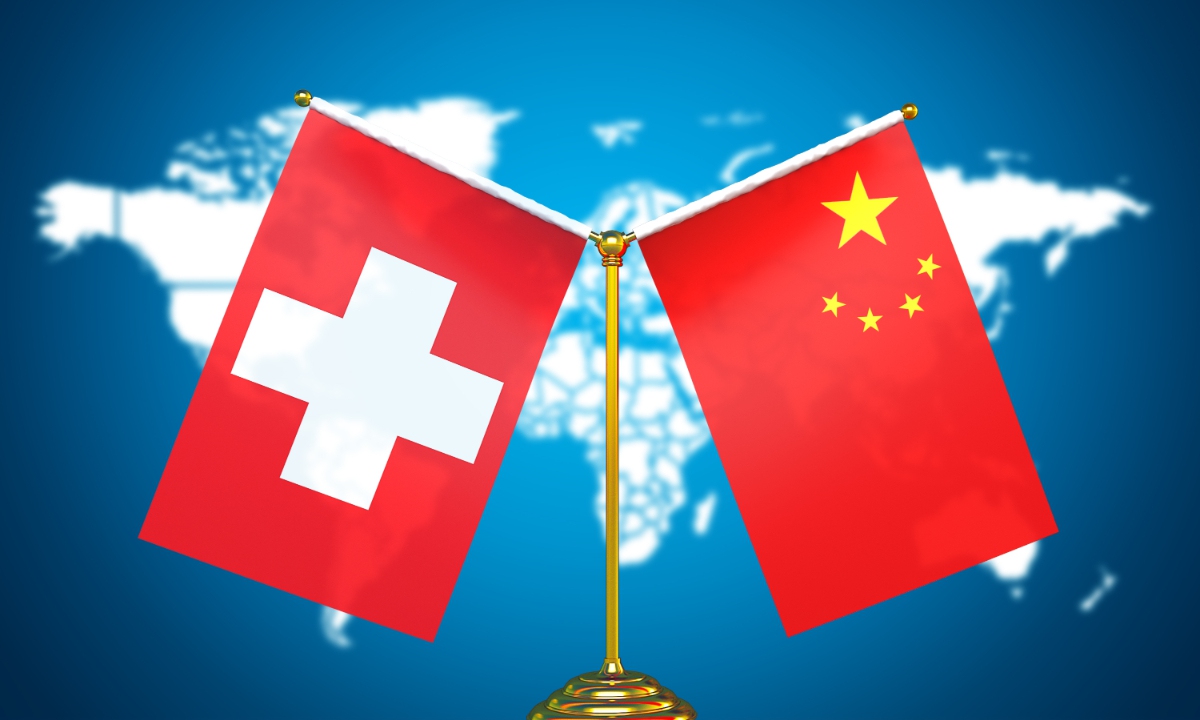
China and Switzerland Photo: VCG
China and Switzerland have inked a memorandum of understanding (MOU) and agreed to formally launch negotiations to upgrade the bilateral free trade agreement (FTA), the Chinese Ministry of Commerce (MOFCOM) announced on Tuesday. This marks another major step in further boosting bilateral economic and trade cooperation.
At a time of rising protectionism in Europe toward China, strengthened cooperation between China and Switzerland offers a prime example for Europe to avoid trade frictions and focus on mutually beneficial cooperation with China, analysts said.
The MOU was signed after a meeting between Chinese Commerce Minister Wang Wentao and Swiss Federal Councilor Guy Parmelin, also head of the Federal Department of Economic Affairs, Education and Research, in Beijing on Monday, MOFCOM said in a statement on Tuesday.
At the meeting, Wang noted that China and Switzerland have close economic ties and are highly complementary, and the bilateral FTA has played a positive role in promoting the growth of trade and investment between the two countries over the past 10 years.
China stands ready to work with the Swiss side to implement the important economic and trade consensus reached by the leaders of the two countries, launch negotiations to upgrade the China-Switzerland FTA as soon as possible, and promote the improvement and upgrading of economic and trade cooperation between the two countries, Wang said.
Wang also said it is hoped that Switzerland will adhere to free trade, oppose protectionism and unilateralism, and continue to provide a fair and open investment environment for Chinese enterprises.
For his part, Parmelin said that China is one of Switzerland's most important economic and trade partners, and various quarters of Swiss society, especially the business community, look forward to the early upgrade of the FTA, according to the MOFCOM statement.
As an open country, Switzerland has always opposed protectionism and restrictions on economic and trade cooperation, and it hopes to strengthen cooperation with China on regulatory policies and intellectual property protection to jointly create a fair and nondiscriminatory business environment for enterprises, Parmelin said.
China and Switzerland signed the FTA in 2013, making Switzerland the first country in the European continent to sign a comprehensive FTA with China. Under the FTA, which took effect in 2014, 99.7 percent of Chinese exports to Switzerland and 84.2 percent of Swiss exports to China enjoy zero tariffs, significantly boosting bilateral trade.
In 2023, total imports and exports between China and Switzerland reached 416.93 billion yuan ($57.34 billion), a year-on-year increase of 9 percent, according to Chinese customs data. Top Chinese exports to Switzerland include mechanical and electrical products, while top Swiss exports to China include jewelry and precious metals and products.
Analysts said that the talks on the upgraded FTA will likely focus on the services industry, with the two sides expected to expand market access and make other arrangements to boost trade in services. The launch of negotiations for the upgraded FTA also underscored the overall friendly ties and strengthening cooperation between China and Switzerland, analysts noted.
"The relationship between Switzerland and China is relatively friendly. I think the bilateral relations have been able to maintain a relatively stable and healthy development over the years, which is a rare and valuable thing," Zhao Junjie, a research fellow at the Chinese Academy of Social Sciences' Institute of European Studies, told the Global Times on Tuesday.
While Switzerland is not a member of the EU, its strengthening economic and trade cooperation with China also offers a valuable example for the EU and other European countries, especially at a time when the EU is stirring up trade tensions with China through a series of protectionist actions against Chinese products and businesses, analysts said.
"Switzerland has long maintained a rational stance toward China, which sets a great example for other European countries," Cui Hongjian, a professor with the Academy of Regional and Global Governance at Beijing Foreign Studies University, told the Global Times on Tuesday.




